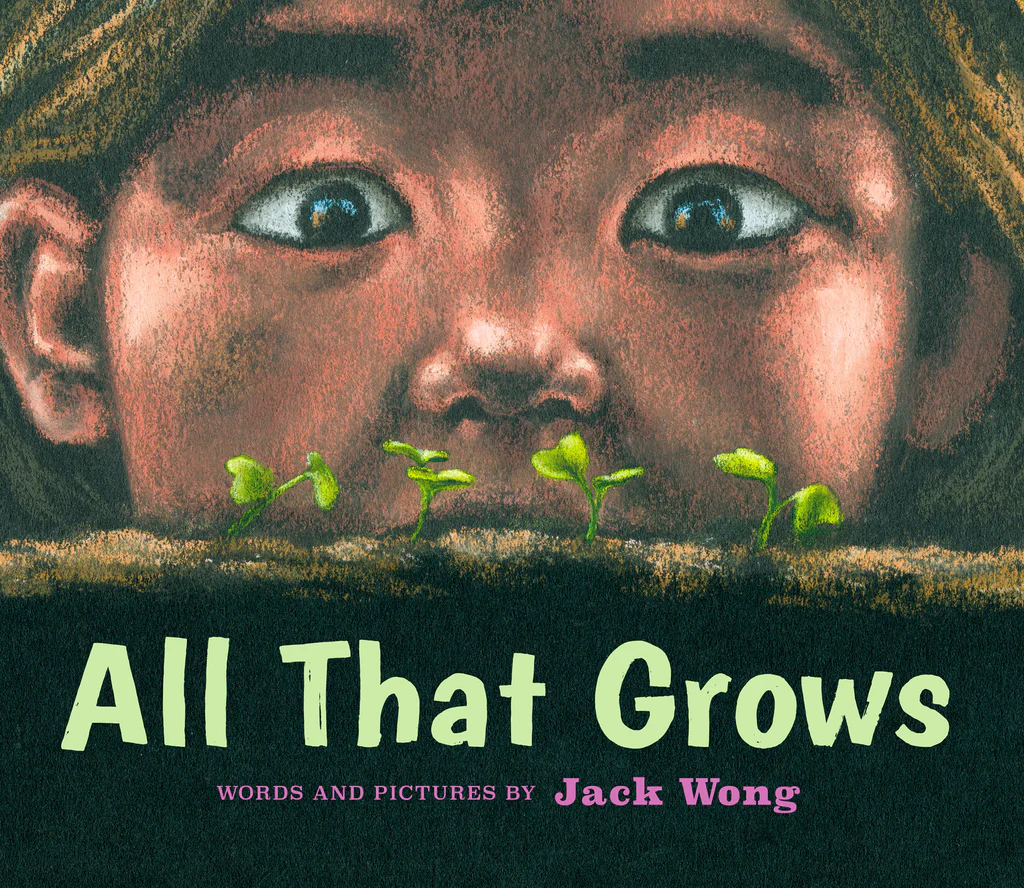
I love the first line of Jack Wong’s new picture book, ALL THAT GROWS. “Magnolias smell like lemon cake,” the protagonist informs the reader, recounting what his older sister has told him. It’s both an inviting and a surprising line — I found myself trying to remember what magnolia flowers smell like to me and if they really do smell like lemon cake, then why? Do the pollinators love lemon cake as much as I do? I’m immediately pulled into the protagonist’s world, which is lush and full of growing things — not just plants but also a growing sense of wonder.
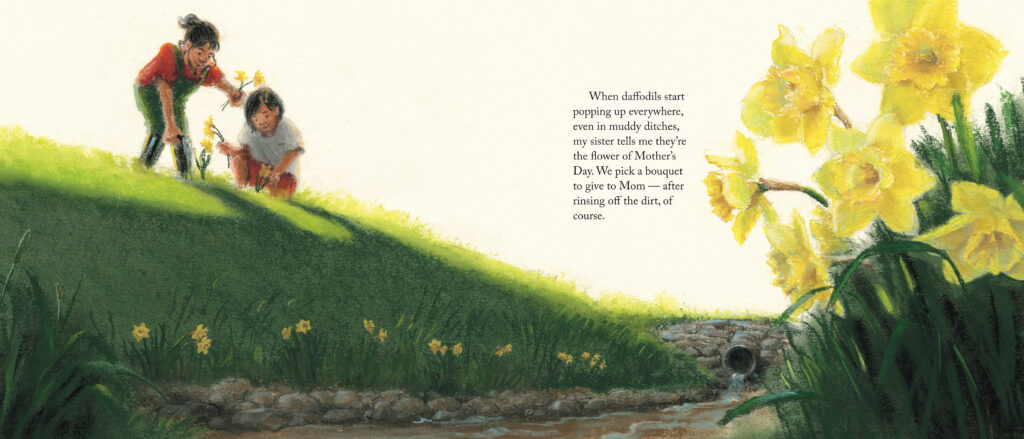
The boy’s older sister is a gardener and a naturalist. She shows him the beauty of the plant life around them and gives him interesting facts along the way. In this way, he becomes more observant of the natural world around him.
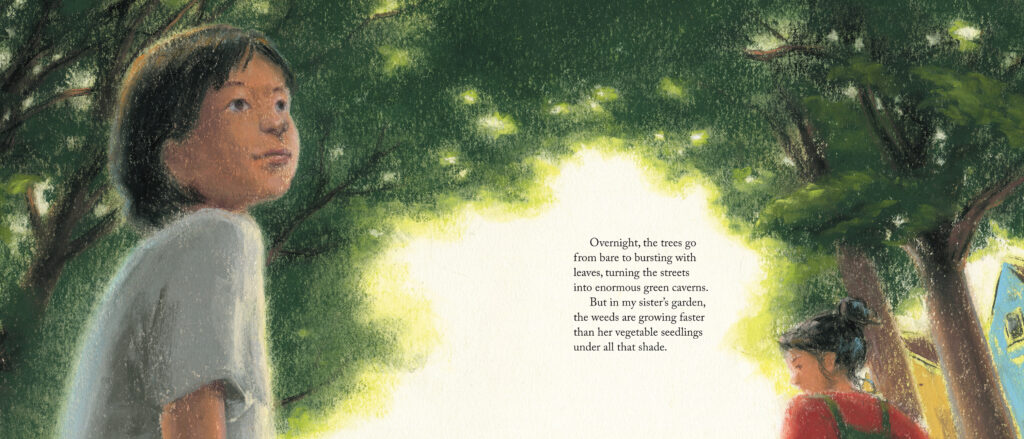
She also enlists his help with her vegetable garden and the siblings pull weeds together. The boy discovers that seedlings of weeds are really hard to tell apart from vegetable sprouts. Even after his sister has given up on one patch, his curiosity makes him “keep watering it to see what grows.”
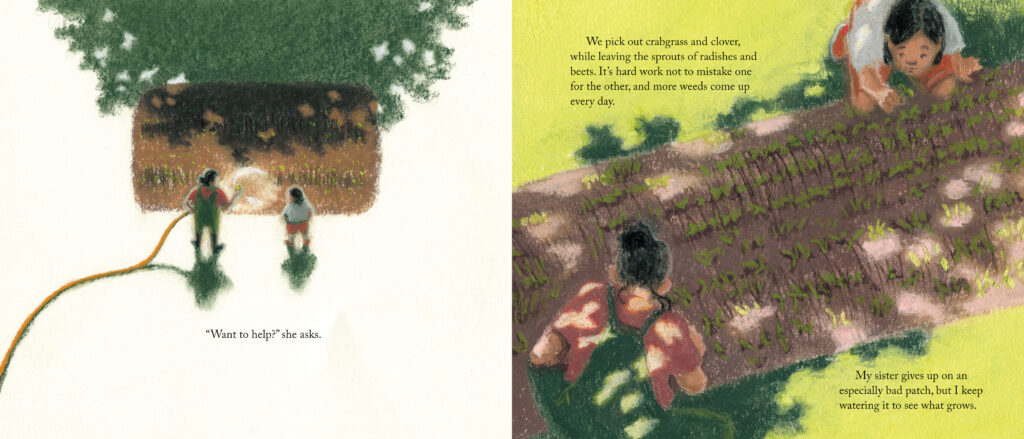
He continues to wonder — “…why only some plants are called vegetables…”
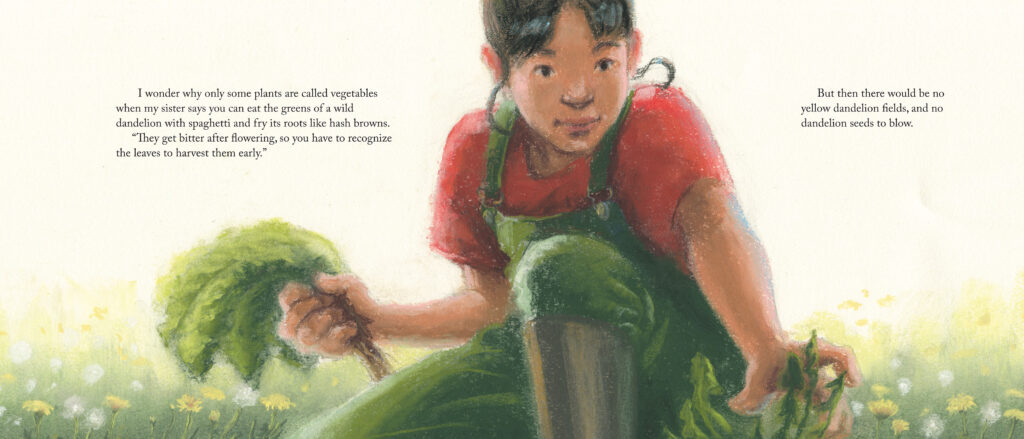
and “why we have to keep pulling up the new saplings that come from our neighbor’s Norway maples.” He’s a little reluctant to pull up both the dandelion leaves and the tree seedlings, thinking about how he likes yellow dandelion fields and how nice it would be to have a little forest of his own.
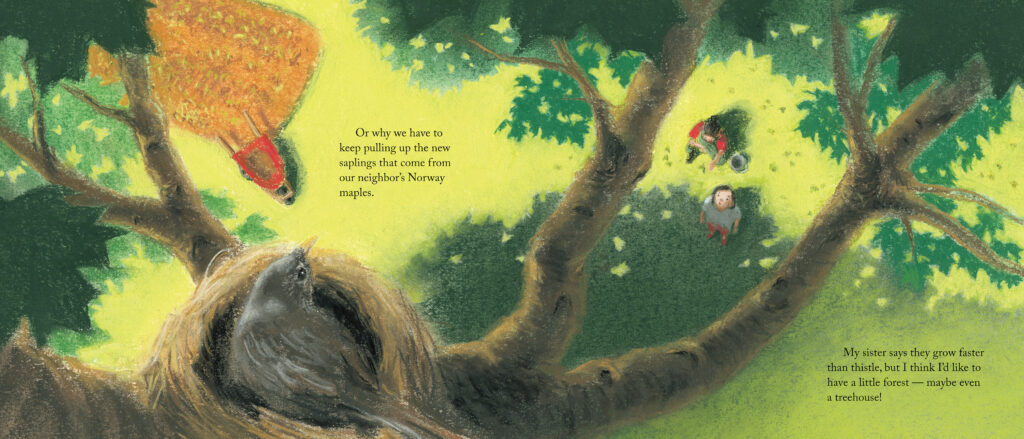
His sister seems to have all the answers. But before the boy falls asleep that night, his curiosity leads him to bigger and bigger questions — what kind of tree is outside his window, how do we know which stars belong to which constellations, and mostly, how does his sister know so much? He doesn’t have the answers, but he realizes that he’s okay with that. The wondering is enough. When a plant with white flowers grows in the weedy part of the garden that his sister doesn’t recognize, she offers to look it up in one of her books for him. “Maybe later,” he says. “Right now, I ask her to help fetch more water for my garden.”
That’s it. The last two lines of the book. It surprised me, just as the beginning line had. I wanted to know what the plant with the white flowers was. I wanted to know if it was edible or smelled like another kind of cake. I needed closure! So I asked Jack, “Would you say that the ending is a little ambiguous?” Here’s what he said:
Jack: “So yes, when you said that the ending is ambiguous, I completely agree. That’s a really great way of describing it. And it really is key to the theme of the book, which I think is about a boy or a child discovering for the first time a level of complexity to the world that they weren’t aware of before. And in this boy’s case, it’s about plants and gardening and flora. But I think, metaphorically, it could apply to any time when a child, for the first time, invests themselves into an area of knowledge or an area of interest and passion and then realizes how big that thing is and how each thing they learn is kind of like a drop in the ocean. And the more things they learn, the more things they realize. The more they learn, the more they realize there is to learn, and the more they realize that there’s still more they don’t know. So, the book is really about this child recognizing that for the first time and understanding that there will always be things that we don’t know and can’t know. And it’s really how you deal with not knowing that counts. In this case, the ending of the book is the boy resolving that maybe it’s okay to live in uncertainty, to not know what the flowers are, but to tend to them, to see them grow, and to hold out that kind of open space for them. And so yeah, that really is part and parcel with the central theme of the book.”
(Andrea here:) Personally, I find that the ending of a story can often be the most difficult part to write. As picture book writers, we’re often told to have the ending circle back to the beginning, or show how the conflict was resolved, or at the very least, answer any remaining questions. So I find Jack’s approach to be fascinating — he is able to leave the ending of the book open to interpretation because that is what the book is about. The journey towards the unknowable. Jack shared a little more about his process in crafting that ending:
Jack: “Something I thought I might share is that even though I knew the ending should be open-ended and ambiguous. Ambiguity kind of speaks through its silence or speaks through the words it doesn’t say. So, it’s really, I felt, hard to get right, and the things I left out had the potential to have other meanings, or the few words that I could use had the potential to have different connotations.
So the first version of the ending was actually, “Maybe there are more flowers out there than I’ll ever know. But this little bit of soil, that’s my garden.”
So that was my original ending for it. We workshopped it with my critique partners a little bit. And it had this connotation of, “that’s my garden.” And “my garden” is still included in the final, but this version of it seemed to emphasize possessiveness. So what the boy seems to be learning is that it’s okay if he doesn’t know what the flowers are as long as he owns them or as long as it’s within his domain and that didn’t sound quite right.
The second version of the ending was, “I asked my sister what the new flowers are.” / “Never seen those before,” she shrugs. / “I wonder what I’ll name them.”
So this was the ending I had for a little while and it ended with “I wonder what I’ll name them,” and it seemed to open this idea that we might not know what something is and we can then apply our own judgments and our own interpretations. But it still seemed that it wanted to pin down exactly what something is and… kind of funneling down towards certainty rather than keeping that kind of openness towards uncertainty. So, I kind of liked the fact that he’ll invent his own name for the flowers, but it also wasn’t quite the right message. So the final ending is really about he doesn’t know what the flowers are. His sister offers to look them up, and maybe later they will because he is curious. But right now what the flowers need, or what he can do, is to tend for them, even despite not knowing exactly what they are.”
(Andrea here again:) I love this peek into Jack’s thought process. And even though I’ll never know what those white flowers are in the boy’s garden, I’m okay with that now. They can be whatever I want them to be, or whatever any reader wants them to be, and that is, perhaps, the best ending of all.
ALL THAT GROWS, written and illustrated by Boston Globe-Horn Book Award winner Jack Wong, released on March 5th and is available wherever you buy books.
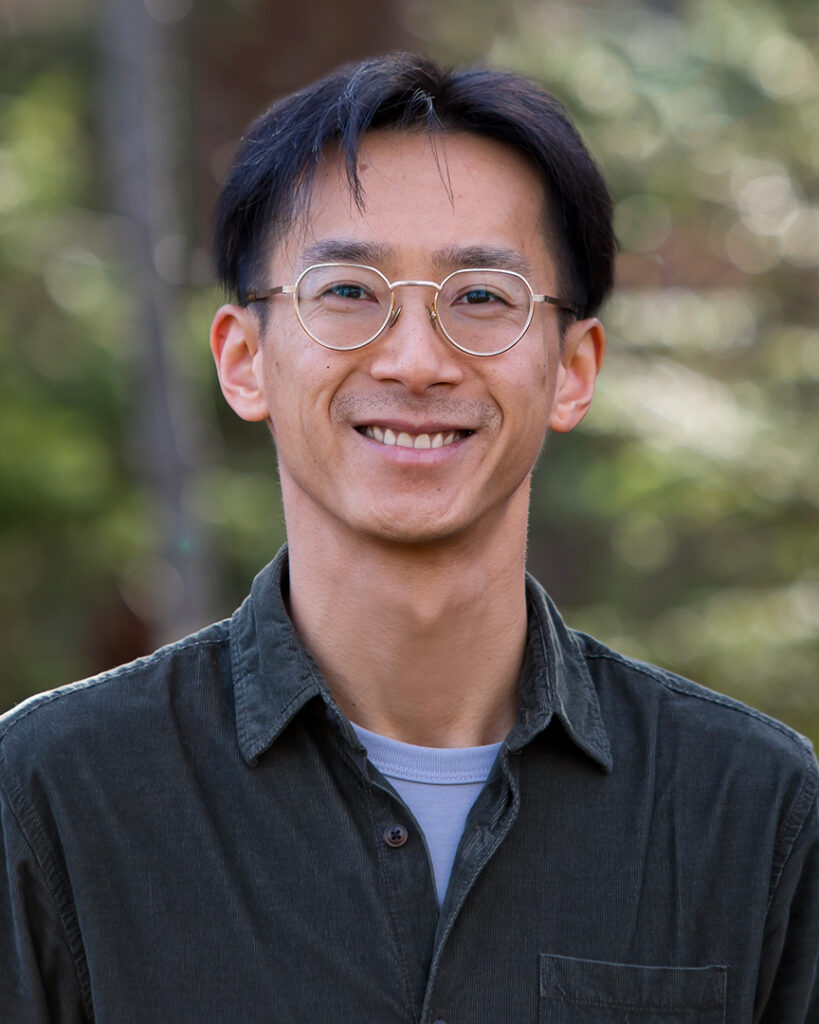
Jack Wong was born in Hong Kong and raised in Vancouver, British Columbia. He left a career as a bridge engineer to pursue a Bachelor of Fine Arts at NSCAD University in beautiful Kjipuktuk/Halifax, Nova Scotia, where he now lives with his wife and two cats. All That Grows owes to all of the above — to taking the leap to learn new things, and to the sanctuary of big neighborhood walks in a small city, especially during the first spring of the pandemic when the sees of this book were planted. Jack is also the author and illustrator of When You Can Swim (Boston Globe–Horn Book Award) and The Words We Share.

This is in my queue, but there is a line at the library! — which is great. You write about ambiguity. The cover: the look in the boy’s eyes as he contemplates these tender little leaves is really interesting – awe, surprise, maybe even a little fear. Thank you, Jack and Andrea. I’m really looking forward to reading this.
I love this comment! As the illustrator, my self-thoughts are always critical: for the cover image, I was worried I didn’t draw the boy’s eyes pointing downward enough at the seedlings… but perhaps it adds to the boy’s ambiguous expression, after all 🙂 Thank you, Sue!
Sounds and looks lovely. I want to read this one.
Thank you, Quinette — I hope you enjoy it!
I love that Jack’s book imparts information about nature through a beautiful story about siblings. Congratulations!
Thank you Judy! I love writing sibling and family stories — it’s my way of saying thank-you, because I’m not that great at doing it IRL 🙂
What an invitation to children to explore and wonder! Thank you for ambiguity.
Thank you, Robin!
Andrea and Jack, thanks for the peek inside the book and your process. I love the ending you ended up with, accepting not knowing everything. Beautiful book!
Thank you, Vijaya — the ending gives me a little hope for myself, too!
Mercy! What a lovely book that appeals to the senses. I need to get my hands on this book…and do some gardening.
Thank you Kathy — I hope you enjoy reading it, and gardening this spring!
Really enjoyed this in-depth look behind the scenes. There is so much deliberating and deciding when framing a book, and it is helpful to hear others discuss the process. Thank you!
Thank you for your comment, Cathy — I felt like I was just rambling to Andrea, so I’m glad to hear the in-depthness wasn’t unwelcome (this may sound facetious, but I mean it!)
This looks like a wonderful book! The exploration of nature is fabulous! Congratulations!
Thank you, Angie!